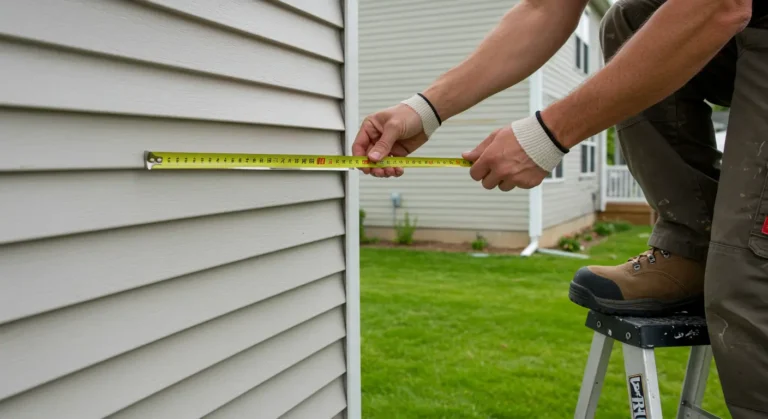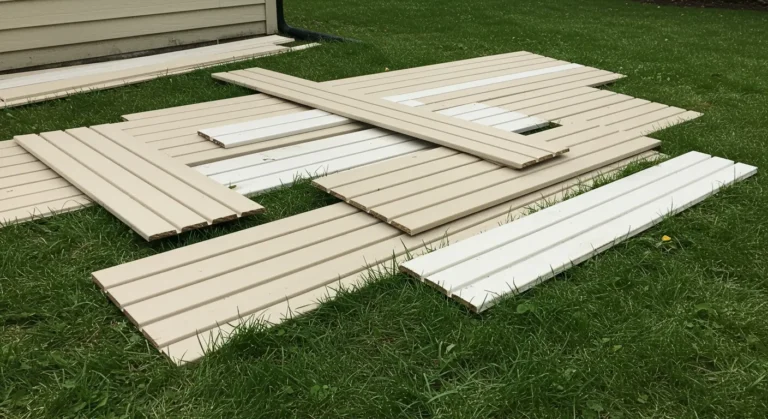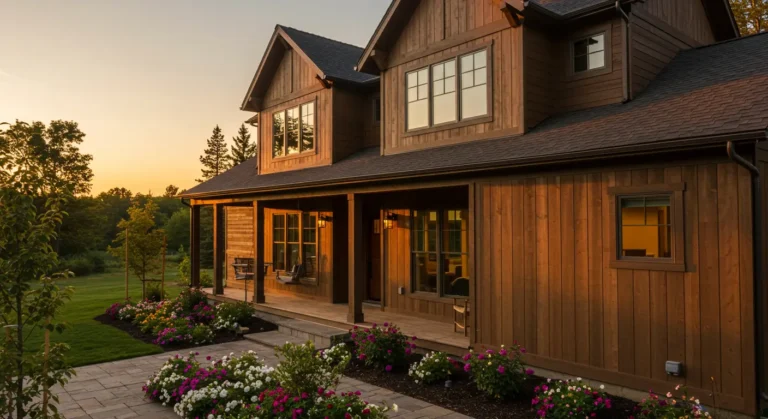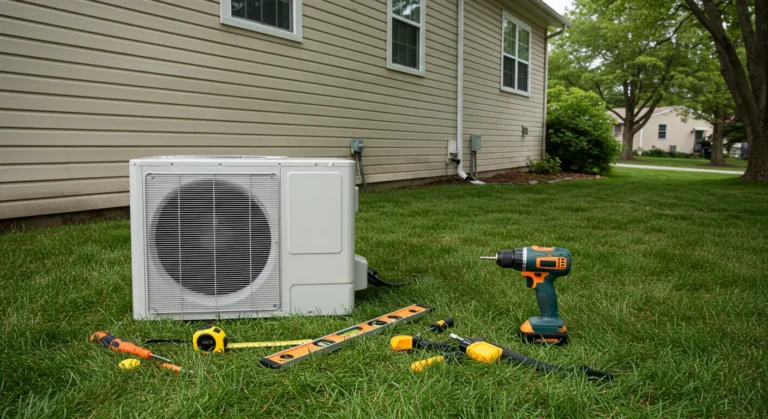If your aluminum siding looks dull, chalky, or outdated, you might be wondering: can you paint aluminum siding? The answer is yes, and when done correctly, it’s one of the most affordable ways to refresh your home’s exterior without a full replacement.
This complete guide will walk you through the benefits and drawbacks, proper prep and paint techniques, common mistakes to avoid, and how to make your painted siding last for years, especially in climate-challenging areas like Louisiana.
Is It a Good Idea to Paint Aluminum Siding?
Painting aluminum siding can be a great decision, but it’s not for everyone. Let’s explore the pros and cons to help you decide if it’s the right move for your home.
Pros
- Budget-friendly alternative to replacement: Painting can cost thousands less than full siding replacement services.
- Instant curb appeal boost: A fresh coat of paint modernizes your home’s look.
- Extends the siding’s life by 10-15 years: If done properly.
- Eco-conscious choice: Avoids sending usable siding to landfills.
- Wide color choices: Easily match your style or HOA requirements.
Cons
- Labor-intensive: Requires detailed cleaning, priming, and multiple coats.
- Doesn’t correct major damage: If the siding is warped, corroded, or cracked, painting may only be a temporary cover.
- Maintenance is still necessary: Painted aluminum siding still requires cleaning and inspection.
Tip: In humid regions like Louisiana, painting aluminum siding can protect against corrosion and extend its life, but proper surface prep is essential for success.
How to Paint Aluminum Siding: Step-by-Step Guide
Before reaching for the paintbrush, it’s critical to follow this step-by-step process. Skipping any step can lead to peeling, cracking, or uneven results.
1. Inspect and Clean the Siding
Use a hose or pressure washer to remove dirt, mildew, and debris. A mild solution of dish soap and water works for light grime. For deeper cleaning, refer to our guide on how to clean vinyl siding; many techniques apply here too.
2. Repair Dents or Damage
Check for cracks, holes, or dented panels. Small issues can be filled with exterior-grade patching compound. Larger or structural damage may warrant siding replacement services.
3. Remove Chalky Residue
Many older aluminum sidings develop a powdery, chalky surface due to oxidation. Scrub thoroughly using a wire brush or sponge with trisodium phosphate (TSP). You must remove this layer before priming or painting.
4. Prime the Surface
Yes, priming is essential. Use a bonding primer designed for aluminum or metal surfaces. This step helps the paint adhere and prevents peeling in the future.
5. Apply the Right Paint
Use a 100% acrylic latex exterior paint. It offers flexibility, UV resistance, and long-term durability. Apply at least two coats for full coverage.
Need brand suggestions? Check out painting aluminum siding advice from Bob Vila or go with trusted options like Sherwin-Williams Duration®.
6. Let It Dry and Cure
Allow each coat to dry thoroughly according to the manufacturer’s instructions. Avoid painting in extreme heat, humidity, or direct sunlight to ensure a flawless finish.
Choosing the Best Paint for Aluminum Siding
The best paint for aluminum siding is:
- 100% acrylic latex (never oil-based)
- Designed for exterior use
- Offers satin or low-luster finish
Recommended Features:
- UV protection: Prevents fading.
- Mildew resistance: Especially in humid or coastal areas.
- Breathability: Allows moisture to escape without blistering.
Avoid high-gloss paint: It tends to highlight dents or imperfections. Satin or eggshell finishes offer a subtle, modern look and better conceal surface flaws.
Common Mistakes to Avoid When Painting Aluminum Siding
Even experienced DIYers can run into trouble without knowing what to avoid. Here are the most common mistakes homeowners make and how you can steer clear:
1. Skipping Cleaning or Prep
Failing to clean or remove chalky oxidation will cause the paint to flake or peel within months. Proper prep is non-negotiable.
2. Not Using Primer
Even if the siding looks clean, unprimed surfaces won’t hold paint well. Always use a quality bonding primer on aluminum.
3. Using the Wrong Paint
Avoid oil-based or interior paints. They can trap moisture and cause blistering. Only use high-quality acrylic latex designed for exteriors.
4. Painting in Bad Weather
Don’t paint on hot, humid, or rainy days. Optimal temperatures are between 50°F and 85°F with low humidity.
5. Neglecting Repairs
Don’t paint over dents, holes, or warped areas. Fix these issues first, otherwise, they’ll still be visible under the fresh paint.
6. Skipping a Test Area
Always test a small section first. It helps confirm that your paint color and finish look right in real daylight conditions.
Tips to Make Your Painted Siding Last Longer
Once you’ve invested time or money into repainting, the goal is to maximize its lifespan. Here’s how:
Perform Regular Cleaning
Clean your siding at least once a year with mild soap and water. Avoid abrasive tools or bleach-based products.
Inspect Annually for Damage
Look for signs of chipping, blistering, or mildew. Spot-treat problem areas early before they worsen.
Schedule Touch-Ups
If small areas begin to fade or peel, recoat them quickly to avoid exposing the aluminum to moisture.
Avoid High-Powered Pressure Washing
It can strip paint or drive moisture beneath panels. A gentle hose spray is usually enough.
Bonus: Our vinyl siding repair tips include helpful maintenance ideas that apply to aluminum too.
Conclusion: When to Paint and When to Replace
So, can you paint aluminum siding? Absolutely. It’s one of the most cost-effective ways to transform your home’s look, extend your siding’s life, and protect against weather damage.
That said, painting isn’t a cure-all. If your siding is cracking, buckling, or nearing the end of its lifespan, you may be better off investing in siding replacement services.
Ready to Transform Your Home’s Exterior?
Book a Free Siding Inspection Today
Let our experts evaluate your siding and help you decide whether painting or replacement is the best fit for your home.
FAQs About Painting Aluminum Siding
Is painting aluminum siding a good idea?
Yes, especially if your siding is structurally sound but faded or dull. It’s a smart, budget-friendly option for improving curb appeal.
Do you need to prime aluminum siding before painting?
Definitely. Primer ensures proper adhesion and helps your topcoat last for years.
How long does painted aluminum siding last?
With correct prep and high-quality paint, expect 10 to 15 years of performance — even in wet, humid climates.
What kind of paint should you use?
Use 100% acrylic latex exterior paint in a low-sheen or satin finish. Avoid glossy or oil-based products.
Can I paint aluminum siding myself?
Yes, it’s a doable DIY project if you’re detail-oriented and patient. But for larger homes or damaged siding, hiring a pro may be best.




